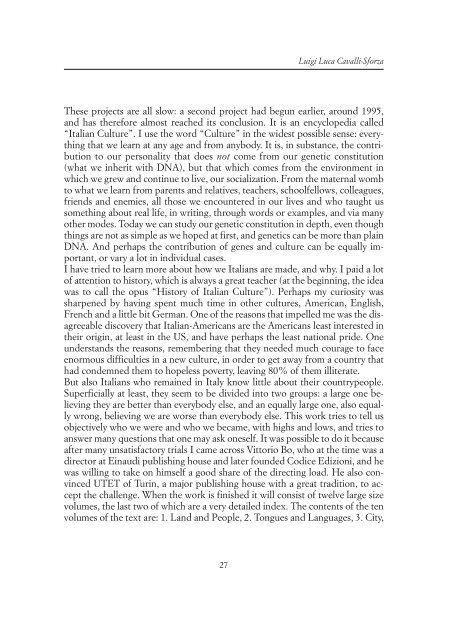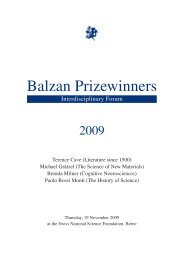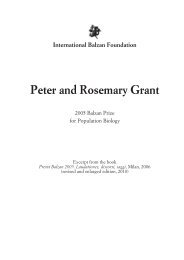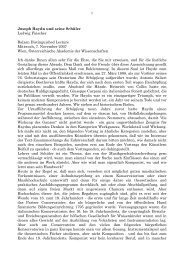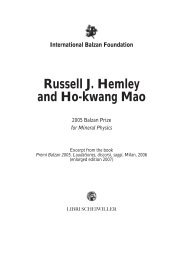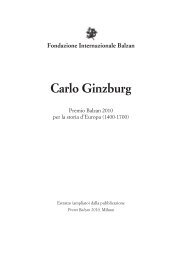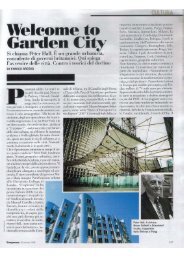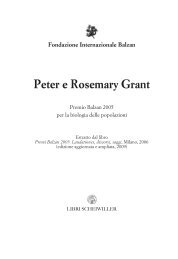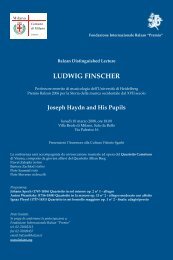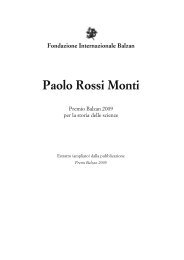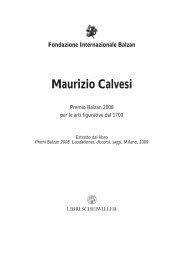International Balzan Foundation Luigi Luca Cavalli
International Balzan Foundation Luigi Luca Cavalli
International Balzan Foundation Luigi Luca Cavalli
Create successful ePaper yourself
Turn your PDF publications into a flip-book with our unique Google optimized e-Paper software.
<strong>Luigi</strong> <strong>Luca</strong> <strong>Cavalli</strong>-Sforza<br />
These projects are all slow: a second project had begun earlier, around 1995,<br />
and has therefore almost reached its conclusion. It is an encyclopedia called<br />
“Italian Culture”. I use the word “Culture” in the widest possible sense: everything<br />
that we learn at any age and from anybody. It is, in substance, the contribution<br />
to our personality that does not come from our genetic constitution<br />
(what we inherit with DNA), but that which comes from the environment in<br />
which we grew and continue to live, our socialization. From the maternal womb<br />
to what we learn from parents and relatives, teachers, schoolfellows, colleagues,<br />
friends and enemies, all those we encountered in our lives and who taught us<br />
something about real life, in writing, through words or examples, and via many<br />
other modes. Today we can study our genetic constitution in depth, even though<br />
things are not as simple as we hoped at first, and genetics can be more than plain<br />
DNA. And perhaps the contribution of genes and culture can be equally important,<br />
or vary a lot in individual cases.<br />
I have tried to learn more about how we Italians are made, and why. I paid a lot<br />
of attention to history, which is always a great teacher (at the beginning, the idea<br />
was to call the opus “History of Italian Culture”). Perhaps my curiosity was<br />
sharpened by having spent much time in other cultures, American, English,<br />
French and a little bit German. One of the reasons that impelled me was the disagreeable<br />
discovery that Italian-Americans are the Americans least interested in<br />
their origin, at least in the US, and have perhaps the least national pride. One<br />
understands the reasons, remembering that they needed much courage to face<br />
enormous difficulties in a new culture, in order to get away from a country that<br />
had condemned them to hopeless poverty, leaving 80% of them illiterate.<br />
But also Italians who remained in Italy know little about their countrypeople.<br />
Superficially at least, they seem to be divided into two groups: a large one believing<br />
they are better than everybody else, and an equally large one, also equally<br />
wrong, believing we are worse than everybody else. This work tries to tell us<br />
objectively who we were and who we became, with highs and lows, and tries to<br />
answer many questions that one may ask oneself. It was possible to do it because<br />
after many unsatisfactory trials I came across Vittorio Bo, who at the time was a<br />
director at Einaudi publishing house and later founded Codice Edizioni, and he<br />
was willing to take on himself a good share of the directing load. He also convinced<br />
UTET of Turin, a major publishing house with a great tradition, to accept<br />
the challenge. When the work is finished it will consist of twelve large size<br />
volumes, the last two of which are a very detailed index. The contents of the ten<br />
volumes of the text are: 1. Land and People, 2. Tongues and Languages, 3. City,<br />
27


